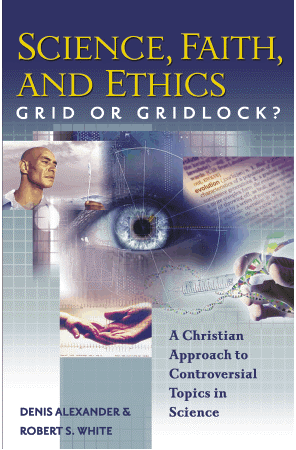Denis Alexander and Robert White: Science, Faith, and Ethics
 Denis Alexander and Robert S. White, Science, Faith, And Ethics: Grid or Gridlock? (Peabody, MA: Hendrickson, 2006), xii + 190 pages, ISBN 9781598560183.
Denis Alexander and Robert S. White, Science, Faith, And Ethics: Grid or Gridlock? (Peabody, MA: Hendrickson, 2006), xii + 190 pages, ISBN 9781598560183.
Molecular biologist Denis Alexander and geophysicist Robert White are committed to both their Christian faith and their scientific fields, which is a characteristic to be emulated by both sides. Since they affirm both, however, this is not a standard ‘apologetic’ work; rather, the authors intend to develop and promote a ‘robust’ theism, all the while defending the verity of science, in a search for meaning and accommodation (perhaps) on both sides. Alexander and White argue that that the natural sciences and Christianity share many attributes with one another, and that any conflict between the two has been due to a priori assumptions, or interpretations of the data that each field presents; there is no real conflict, then, in truth, as the two are congruent. At the same time, however, they do not read too much into the congruencies between the two, as if the consonances reflect beneficially unto theology. In what follows, we will explore individual chapters a little more closely.
The first five chapters constitute part one, and focus – largely – on the relation of science to religion, and vice-versa. They address such issues as whether there are two separate knowledge domains – science and religious – or if the two are interdependent; it seems that they tend more-so toward the latter view than former. In successive chapters, the third and fourth, they show that neither science nor religion are discredited by discoveries in the opposite realm. In the fifth, they argue that science could benefit from the encounter and interaction with religion.
The second part of the book addresses ‘hot issues’ within the science-religion dialogue in the twenty-first century, and comprises four chapters. In the sixth, they address the issue of whether the world – and humans are created or has evolved; notably, they answer with an affirmation of both. Herein they ably discuss the three mechanisms of evolution, consisting of mutation, recombination, and gene flow; they affirm Asa Gray’s intention, directly following the publication of On the Origin of Species, to ‘baptize’ Darwin’s theory of evolution, insomuch as ‘nature is what God does’ (109). Chapter seven considers genetic engineering from a Christian perspective, and the authors advocate that we should not attempt to change the essence or telos of any organism, but that it is permissible to proverbially ‘tinker’ with various organisms (they make particular mention of transgenic plants, with reference to both pesticide and herbicide resistance, on pg. . 117). In chapter eight, the authors assert that we – as Christians – have a responsibility to be decent stewards of God’s creation, and we thus should engage in the environmental debate. The ninth chapter affirms that Christians should be – and need to be! – actively involved in contemporary science as active scientists, and thereby preserving and promoting integrity therein. All in all, the authors argue that that Christianity has much to contribute to the scientific and ethical debates facing today’s world, and we would do well to heed their advice.
Reviewed by Bradford McCall
Publisher’s page: http://www.hendrickson.com/html/product/560182.trade.html
This review was first published on the In Depth Resources page of the Pneuma Foundation (parent organization to PneumaReview.com) February 22, 2010.
Category: In Depth, Summer 2015


